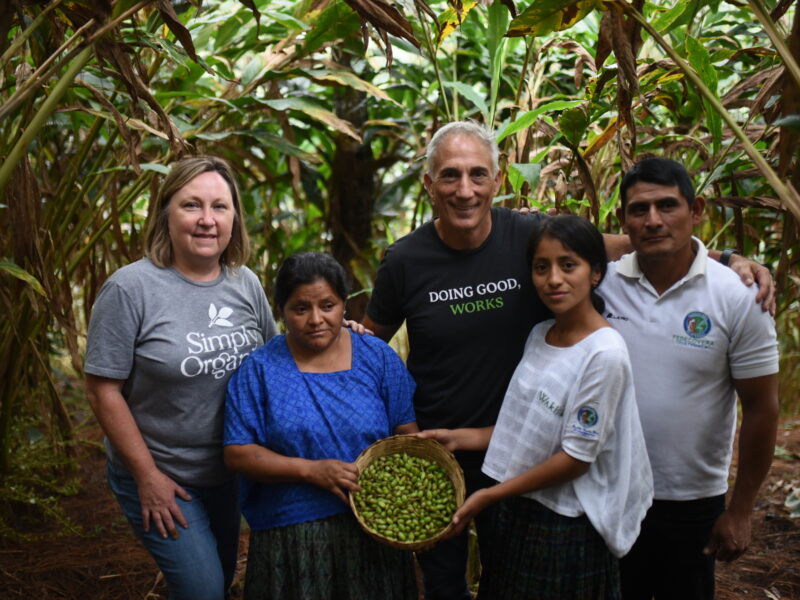The Organic Center and Organic Voices are delighted to announce their joint hosting of the 2024 Organic Gala at Natural Products Expo West on March 13 in Anaheim, California. The organic sector’s premier event at the trade show, the theme of the celebration is “An Organic Night Out: Honoring the Year’s Best in Organic,” and will recognize the outstanding work of a group of individuals, brands and businesses in communicating the benefits of organic to consumers. Organic Valley’s Organic Reduced Fat Eggnog is now available nationwide for the 2023 holiday season! With a made-from-scratch recipe, the new eggnog delivers a great-tasting, creamy flavor that consumers will love. And like all Organic Valley products, the delicious eggnog is made with high-quality, organic ingredients, including milk from small family farms where the cows are raised without the use of antibiotics, synthetic hormones, toxic pesticides, or GMOs. Leaders from three large-scale farming operations voiced optimism for the future of organic production, even as inflation, labor woes and other challenges continue to confront producers. Research undertaken by Professor Andrew Neal at the Rothamsted Agricultural Research Centre and published in the journal Nature Food in January found that adding organic matter like manure to soils reduces the emissions of nitrous oxide from soil very significantly, in comparison with soils which have had only inorganic synthetic fertilizers added. Synthetic fertilizers are banned under organic standards. Organic farming also promotes “closed loop agriculture” where the farm recycles all nutrients and organic matter back to the soil by composting, for example, making the farm more sustainable. It’s hard to find a job fighting climate change, oddly. But the organic farming industry is one place where a person can make a living making a difference. Food systems account for 20% to 30% of global greenhouse gas emissions, according to data from the World Bank. The reinvention of farming could impact the future as much as the electric car. The latest research from CivicScience suggests that buying organic isn’t going away any time soon. The firm’s data tracking shows the quarterly percentage of American adults who say they purchase organic food regularly (or, “every chance I get,”) is up two percentage points since the first quarter of 2021, reaching 12%. Additionally, the number of consumers who shop organic “when it’s convenient” has risen two percentage points to reach 21%.
How Organic Valley Is Fueling Supply Chain Resilience
With supply chain’s newfound designation as an enabler of strategy, leaders are now expected to contribute significantly to overall enterprise goals, including sustainability, revenue generation and deepening relationships with consumers — while also managing geopolitical tensions, climate disruptions, and lingering materials shortages.
https://consumergoods.com/how-organic-valley-fueling-supply-chain-resilience
The Organic Center and Organic Voices Teaming Up to Present “Organic Oscars”
The Organic Center and Organic Voices are delighted to announce their joint hosting of the 2024 Organic Gala at Natural Products Expo West on March 13 in Anaheim, California. The organic sector’s premier event at the trade show, the theme of the celebration is “An Organic Night Out: Honoring the Year’s Best in Organic,” and will recognize the outstanding work of a group of individuals, brands and businesses in communicating the benefits of organic to consumers.
Organic Growers See New Role In The Age Of Climate Change
It’s hard to find a job fighting climate change, oddly. But the organic farming industry is one place where a person can make a living making a difference. Food systems account for 20% to 30% of global greenhouse gas emissions, according to data from the World Bank. The reinvention of farming could impact the future as much as the electric car.
https://www.sfgate.com/news/bayarea/article/organic-growers-see-new-role-in-the-age-of-18532796.php
Organic Growth Continues, Even Amidst Inflation
The latest research from CivicScience suggests that buying organic isn’t going away any time soon. The firm’s data tracking shows the quarterly percentage of American adults who say they purchase organic food regularly (or, “every chance I get,”) is up two percentage points since the first quarter of 2021, reaching 12%. Additionally, the number of consumers who shop organic “when it’s convenient” has risen two percentage points to reach 21%.
https://foodinstitute.com/organic/organic-growth-continues-even-amidst-inflation/
Organic really does help climate
Research undertaken by Professor Andrew Neal at the Rothamsted Agricultural Research Centre and published in the journal Nature Food in January found that adding organic matter like manure to soils reduces the emissions of nitrous oxide from soil very significantly, in comparison with soils which have had only inorganic synthetic fertilizers added. Synthetic fertilizers are banned under organic standards. Organic farming also promotes “closed loop agriculture” where the farm recycles all nutrients and organic matter back to the soil by composting, for example, making the farm more sustainable.
https://www.henleystandard.co.uk/news/environment/185518/organic-really-does-help-climate.html









